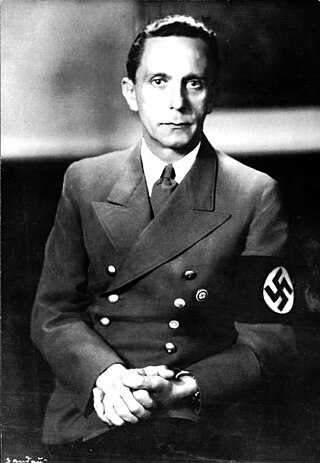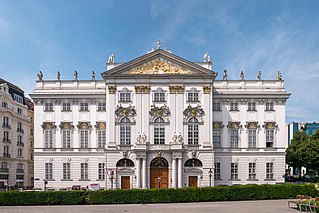Related Research Articles

The Austrian Empire, officially known as the Empire of Austria, was a multinational European great power from 1804 to 1867, created by proclamation out of the realms of the Habsburgs. During its existence, it was the third most populous monarchy in Europe after the Russian Empire and the United Kingdom. Along with Prussia, it was one of the two major powers of the German Confederation. Geographically, it was the third-largest empire in Europe after the Russian Empire and the First French Empire.

The German Chancellery is an agency serving the executive office of the chancellor of Germany, the head of the federal government, currently Olaf Scholz. The Chancellery's primary function is to assist the chancellor in coordinating the activities of the federal government. The head of the Chancellery holds the rank of either a Secretary of State or a Federal Minister, currently held by Wolfgang Schmidt. The headquarters of the German Chancellery is at the Federal Chancellery building in Berlin, which is the largest government headquarters in the world.

The Federal Ministry of Finance, abbreviated BMF, is the cabinet-level finance ministry of Germany, with its seat at the Detlev-Rohwedder-Haus in Berlin and a secondary office in Bonn. The current Federal Minister of Finance is Christian Lindner (FDP).

The German Patent and Trade Mark Office is the German national patent office, with headquarters in Munich, and offices in Berlin and Jena. In 2006 it employed 2556 people, of which about 700 were patent examiners.

The Federal Ministry of the Interior and Community (German: Bundesministerium des Innern und für Heimat, German pronunciation:[ˈbʊndəsminɪsˌteːʁiʊmdɛsˈɪnəʁnʊntfyːɐ̯ˈhaɪ̯maːt], abbreviated BMI, is a cabinet-level ministry of the Federal Republic of Germany. Its main office is in Berlin, with a secondary seat in Bonn. The current minister is Nancy Faeser. It is comparable to the British Home Office or a combination of the US Department of Homeland Security and the US Department of Justice, because both manage several law enforcement agencies. The BMI is tasked with the internal security of Germany. To fulfill this responsibility it maintains, among other agencies, the two biggest federal law enforcement agencies in Germany, the Federal Police and the Federal Criminal Police Office. It is also responsible for the federal domestic intelligence agency, the Federal Office for the Protection of the Constitution.

The Federal Ministry of Justice, abbreviated BMJ, is a cabinet-level ministry of the Federal Republic of Germany. Under the German federal system, individual States are most responsible for the administration of justice and the application of penalties. The Federal Ministry of Justice devotes itself to creating and changing law in the classic core areas related to Constitutional law. The Ministry also analyzes the legality and constitutionality of laws prepared by other ministries. The German Federal Court of Justice, the German Patent and Trade Mark Office (GPTO), and the German Patent Court all fall under its scope, including affairs on court administration. The ministry is officially located in Berlin.

Eugen Schiffer was a German lawyer and liberal politician. He served as Minister of Finance and deputy head of government in the Weimar Republic from February to April 1919. From October 1919 to March 1920, he was again deputy head of government and Minister of Justice. In 1921, he once more became Minister of Justice. Schiffer was a founder-member of the liberal German Democratic Party (DDP) in 1918 and 1919 and co-founder in 1946 of its East German successor party, the Liberal Democratic Party of Germany (LDPD).

The Reich Ministry for Public Enlightenment and Propaganda, also known simply as the Ministry of Propaganda, controlled the content of the press, literature, visual arts, film, theater, music and radio in Nazi Germany.
Cornelia Rudloff-Schäffer is a former president of the Deutsches Patent- und Markenamt (DPMA), a post she held from 1 January 2009 until her retirement in January 2023. She studied law, politics and media studies and was, after the second legal civil service examination, employed as academic employee at the Max Planck Institute for Foreign and International Patent, Copyright and Competition Law and at the Institut for the Protection of Industrial Property at the Ludwig Maximilian University of Munich. She retired at the end of January 2023 and was succeeded by Eva Schewior. Rudloff-Schäffer was the first woman to head the German Patent and Trade Mark Office "in the 145-year history of the office".

Hans-Joachim von Merkatz was a German politician. He was Federal Minister of Justice from 1956 to 1957. He was a member of the Bundestag from 1949 to 1961. He was a member of the German Party before joining the Christian Democrats in 1960.

Hans Arnold Engelhard was a German jurist. A member of the Free Democratic Party (FDP), he served as German Federal Minister of Justice in the Cabinet Kohl I, II, and III, between 1982 and 1991.

Amt Rosenberg was an official body for cultural policy and surveillance within the Nazi party, headed by Alfred Rosenberg. It was established in 1934 under the name of Dienststelle Rosenberg, with offices at Margarethenstraße 17 in Berlin, to the west of Potsdamer Platz. Due to the long official name of Rosenberg's function, Beauftragter des Führers für die gesamte geistige und weltanschauliche Erziehung der NSDAP, the short description Reichsüberwachungsamt "Reich surveillance office" was used alongside, also shortened simply to Überwachungsamt "surveillance office".
Curt Walter Joël was a German jurist and civil servant. He was the senior civil servant in the Ministry of Justice for much of the 1920s and early 1930s, during the Weimar Republic era. Joël also served as acting Minister of Justice and in 1931/32 was a member of Heinrich Brüning's second cabinet.
Rudolf Arnold Nieberding was a German jurist and politician.

The Ministry of Justice is the government ministry of Austria responsible for the administration of justice. The ministry exercises administrative supervision and is charged with the compensation of the judiciary and the prosecutors, manages their office buildings and facilities, and administers the prison system.

The Reich Ministry of Food and Agriculture was responsible for the agricultural policy of Germany during the Weimar Republic from 1919 to 1933 and during the Nazi dictatorship of the Third Reich from 1933 to 1945. It was headed by a Reichsminister under whom a state secretary served. On 1 January 1935, the ministry merged with the Prussian Ministry of Agriculture, Domains and Forests, founded in 1879. Until 1938 and the Anschluss with Austria, it was called the "Reich and Prussian Ministry of Food and Agriculture". After the end of National Socialism in 1945 and of the Allied occupation of Germany, the Federal Ministry of Food and Agriculture was established in 1949 as a successor in the Federal Republic of Germany.

Hermann Karl August Weinkauff was a German jurist. He served in several positions as a judge and later became the first President of the Federal Court of Justice of West Germany.
References
- Kenneth F. Ledford. From General Estate to Special Interest: German Lawyers 1878-1933. Cambridge University Press, Nov 2, 2006 pg. 75
- Hans Schulte-Nölke. Das Reichsjustizamt und die Entstehung des Bürgerlichen Gesetzbuchs (IUS COMMUNE, Veröffentlichungen des Max-Planck-Instituts für Europäische Rechtsgeschichte, Vol. 71), Klostermann, Frankfurt/Main 1995, XIX, 378 pp